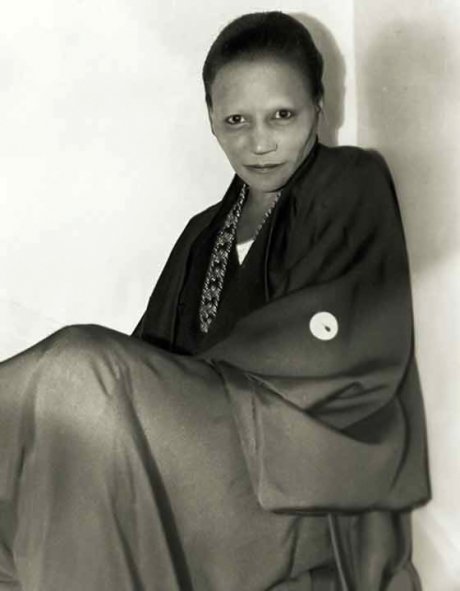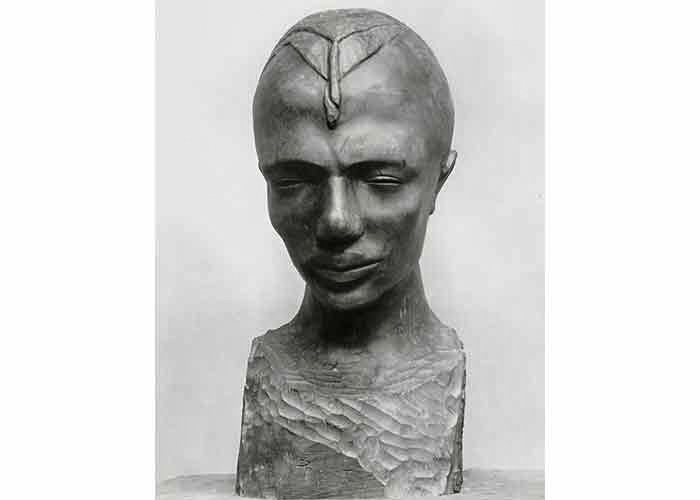Historic Exhibit of Noted African American Sculptor Features Items from RIC’s Special Collections
- News & Events
- News
- Historic Exhibit of Noted African American Sculptor Features Items from RIC’s Special Collections

A native of Rhode Island, Nancy Elizabeth Prophet was one of America’s most elite African American sculptors.
The most comprehensive exhibit of artwork by Rhode Island-born sculptor Nancy Elizabeth Prophet will include 24 items from RIC’s Special Collections at Adams Library. These items have been archived at Rhode Island College for nearly 50 years.
Titled “Nancy Elizabeth Prophet: I Will Not Bend an Inch,” this exhibit will be on view at the Rhode Island School of Design (RISD) Museum from Feb. 17-Aug. 4, after which it will travel to the Brooklyn Museum and the Spelman College Museum of Fine Art.
Among the items RIC has loaned to the exhibit include a bronze casting of Prophet’s marble sculpture “Silence”; a terra cotta mask; pencil, watercolor and chalk sketches; personal photos of Prophet and her father; and newspaper clippings.
Prophet’s belongings were donated to RIC in 1977 by James Williams, the first president of the Urban League of Rhode Island.
“Williams was diligent about promoting black artists in Rhode Island,” says Veronica Denison, RIC Special Collections librarian. “In the 1970s he was part of a committee to recognize Prophet, whose work before that time remained in relative obscurity. It’s nice that due to this RISD exhibition, she will receive the national and international recognition that she deserved when she was living.”
Born in Warwick, Rhode Island, in 1890, Prophet built a career in modernist-style sculpture, working in marble, wood, bronze and plaster. After graduating from RISD, one of the first African Americans to do so, Prophet moved to Paris in the late 1920s, where she studied at L’Ecole de Beaux-Arts. Her work was featured in several French galleries, and her sculpture “Congolaise” was one of the first African American artworks purchased by the Whitney Museum in New York City. Following her time in Paris, Prophet returned to the United States in the 1930s to teach art at Spelman and Atlanta University. She later died in 1960 in Providence.

Sara Picard, associate professor of art at RIC, says she became aware of Prophet’s work during her graduate school studies.
“Prophet overcame many obstacles and persevered through racism and other social inequities,” Picard says. “Her journey can serve as an inspiration for today’s art students and enthusiasts. What stood out about Prophet is that her process was so visible and the materials she used made her work expressive.”
Denison says she hopes renewed interest in Prophet will draw students and the greater Rhode Island community to see the special collection of her work at RIC.
“While we have her work digitized online, I think you get more of a personal connection when you see it up close,” Denison says. “These are archives that she created and retained. That means these items were important and she took special effort to save them.”
RISD Museum hours are 10 a.m.-5 p.m. on Tuesdays, Wednesdays, Fridays, Saturdays and Sundays; and noon-8 p.m. on Thursdays. Admission is free on Sundays from 10 a.m.-5 p.m. and Thursday evenings from 5-8 p.m. Otherwise, admission is $20 for adults; $15 for seniors; $10 for college students with valid ID and free to children 18 and under.
Select items from RIC’s Prophet’s collection can be viewed at DigitalCommons@RIC.
